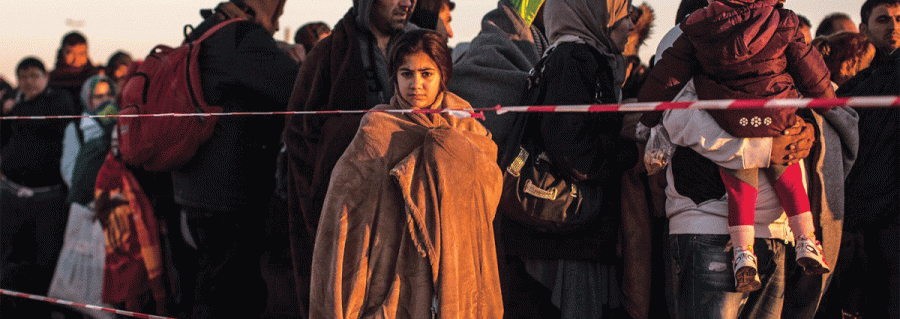Audiences Seek Refuge From ‘Exodus’ Tragic Insights
Refugees gather feeling both hopeful and afraid, as their journey to safety grows increasingly dangerous.
The First-Year Seminar program and Living Writers co-sponsored the Friday Night Film Series screening of “Exodus,” on Friday, September 7 in Golden Auditorium. Directed by James Bluemel and released in 2016, “Exodus” follows the stories of multiple refugees as they flee their homes for safer countries, recording their journey with cell phone cameras. “Exodus” aims to educate the world on what it means to be a refugee behind the scenes of a professional camera crew, and that anyone can become a refugee regardless of circumstance.
The central plot features an 11-year-old girl, Isra’a, and her family making their way to Europe after fleeing Syria following the bombings of Aleppo. Previously, Isra’a’s father, Tarek, was a successful restaurant owner who turned to selling cigarettes once they landed in Izmir, Turkey.
“I had a restaurant selling falafel and shawarma, until the Syrian crisis started. A country that’s thousands of years old was destroyed in a moment,” Tarek said.
Their family had been struggling to decide whether or not to head out on the Aegean Sea in hopes of making it to Greece. News stories of refugees wearing counterfeit life jackets drowning and washing up ashore after a their dinghies had sunk kept the family weary of their next move.
“Exodus” also told the story of a young English teacher named Hassan Akkad, who had fled from Damascus, Syria to the United Kingdom. He recorded his first trip headed for Greece via his cell phone, capturing a video dozens of people squeezed into a nine meter dinghy. Their plan was simple: as soon as they reached Greek waters, they would call immediately for the Greek coast guard to rescue them.
However, as they neared the border and carefully monitored their GPS, the dinghy began filling with water at an alarming pace. Several adults put on life preservers and floated alongside the dinghy while the rest of the refugees desperately scooped water out of the vessel. People held each other tight, before one passenger shouted “Call the emergency!” They had not made it to Greek waters and were rescued by Turkish authorities who brought them back to Izmir. “Back to square one,” Akkad said.
The film stressed that not all refugees are poor people: many refugees had owned homes, shops and cars. They sold all of these properties so that they could make their journey, where a dinghy across the Aegean Sea may cost upwards of 5,000 euro. The people who became refugees did not want to leave their home countries. They had families back home, traditions and familiarity that they were forced away from by violence. The refugees are simply people who wanted a peaceful life away from harm’s way.
The travels of refugees are often unsafe, even in countries that do not have ongoing conflicts. When Akkad finally made his way to France, he landed up in a refugee camp called “the Jungle” in Calais. The United Kingdom was right across the Strait of Dover, yet his travel ceased when he was trapped in “the Jungle” for nearly two months with no means across the river. Filming with his cell phone, Akkad captured the carnage at the camp, with explosions rocking the flimsy tents set up as makeshift homes. Even in a country like France, refugees are not safe from violence.
“Exodus” teaches us that anyone can be a refugee. They simply want to live a peaceful life and escape the violence. The film ends with an open-ended narrative describing how few of the people in the film received asylum and some are still in the process or have been outright denied, leaving one feeling as if they should take action to help anyone who is or may become a refugee.
Contact Kuba Aliki at [email protected].








Betty Ann • Apr 24, 2020 at 6:26 am
Your topic is very nice and helpful to us … Thank you for the information you wrote